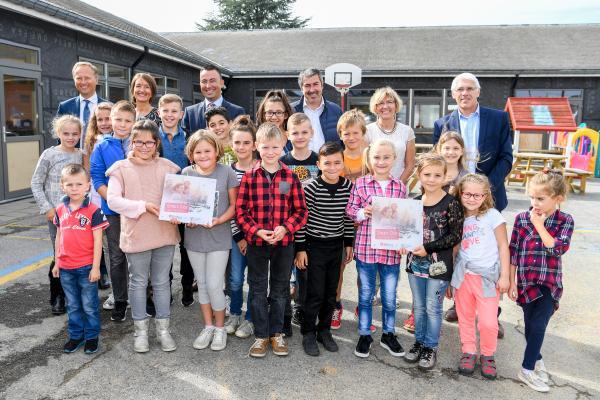
Over the last few years, the municipality of Flémalle in Liège Province has endeavoured to improve the energy performance of its buildings, thereby contributing to a 20% reduction in CO2 emissions in its area by 2020 (to which it has committed under the Covenant of Mayors). This initiative recently resulted in the implementation of two new “smart and sustainable” projects under the Smart Cities, Climate Action & Circular Economy financing programme of the European Investment Bank (EIB) and Belfius Banque.
A fully refurbished and therefore much more energy-efficient building was waiting for the 150 nursery and primary pupils at the Gros-Chêne municipal school in Flémalle on 1 September 2017. Overheating in early summer and cold in the winter – caused by a lack of thermal inertia and insulation in the 1960s RTG-type prefabricated buildings – are now a thing of the past. Insulation of the roof and external walls, new insulating double-glazing frames, replacement of the antiquated and oversized oil-fired boiler with a new regulated gas condensing boiler, an extensive energy-efficient renovation will enable this pretty little school to save a total of around 60 000 kWh or the equivalent of 16 tonnes of CO2 a year. This will all benefit both the environment and the municipal budget, not forgetting of course the pupils and teachers, who will enjoy significantly improved levels of comfort.
In addition and in parallel to the energy-efficient renovation of the old building, an extension is under construction to provide the school with four further classrooms in view of its growing pupil numbers.
A sustainable vision
In addition to the Gros-Chêne school, work to substantially improve the energy efficiency of another municipal site in Flémalle has also recently been carried out. Mainly occupied by the Youth, Culture, Sport and Leisure Department (JCSL) and the Local Sports Centre, this building on rue des Marnières also hosts some CPAS (Public Social Action Centre) activities (workshops and evening classes) and various associations. After insulating and renovating the roof in 2012, the municipality wanted to further improve energy performance by insulating the external walls and by replacing the existing window frames with high energy efficiency double-glazing. The ageing boiler was also replaced with a new gas condensing boiler with a regulation system making it possible to adapt to the specific requirements of the building's various uses. Estimated annual savings resulting from this work stand at over 195 000 kWh.
Original financing
To implement these two projects, the municipal authorities were able to secure favourable financing via the Smart Cities, Climate Action & Circular Economy programme launched by Belfius and the EIB last December*. EIB and Belfius experts particularly thought that the energy-efficient renovation of the Gros-Chêne school would provide a clear example for numerous similar schools in Belgium and other Member States.
Valter Polese, councillor for Buildings and Energy, said: “In signing the Covenant of Mayors in late 2015, we committed to cutting CO2 emissions within the municipality by 20% compared to their 2006 levels by 2020. The energy-efficient renovation of these two buildings is completely in line with this objective, making it possible to avoid the emission of 40 tonnes of CO2 and save around EUR 9 000 a year. We are particularly pleased that these projects could be financed via the Smart Cities, Climate Action & Circular Economy programme of Belfius and the EIB. The favourable terms of the EU funding made it possible to substantially reduce the interest charges, which is beneficial to both the municipality's budget and its residents. By improving the energy efficiency of our own buildings, we are not only helping to cut CO2 emissions on a local level, but also wish to set an example as a public body, encouraging businesses, individuals and other organisations to take their own practical measures against global warming.”
EIB Vice-President Pim van Ballekom said: “Modern, sustainable and energy-efficient infrastructure is vital for training young people and also for combating climate change. These are priorities for the EIB as the EU bank. And together with Belfius, our long-standing partner for the Smart Cities programme, we are confident that by supporting cities and municipalities we will be able to make a quick and direct impact on our environment and people's daily lives.”
Dirk Gyselinck, Head of Public & Corporate Banking at Belfius, said: “Belfius is proud to inaugurate the first two projects supported by the second Smart Cities programme (Smart Cities, Climate Action & Circular Economy). The various ongoing projects demonstrate the commitment of all of the local authorities – via their SMART projects – to combating global warming.”
EUR 800m for Smart City projects in Belgium
The Smart Cities & Sustainable Development programme, launched as the first of its kind in Europe in 2014, has made it possible to support 62 smart projects over two and a half years for a total of almost EUR 400m, including in Flémalle, but also in Spa, Limbourg, Andenne, Liège, Ath, Genappe, Fosses-la-Ville, Hastière, Villers-la-Ville, Rebecq, Silly, Wavre, Gembloux, Sambreville, Dinant, Marche-en-Famenne, Mouscron, Tournai, Perwez and Bütgenbach. These 62 projects, which are all already complete or in progress, affect more than 1.4 million residents and mostly fall within an integrated approach combining urban development, sustainable mobility and energy efficiency.
Buoyed by this success, in late 2016 the EIB and Belfius decided to provide a further EUR 400m to finance other smart, inclusive and sustainable projects mounted by local authorities, inter-municipal groupings and social sector (education and healthcare) non-profit organisations.
With this new Smart Cities, Climate Action & Circular Economy programme, Belfius and the EIB intend to continue actively supporting the Smart Cities initiative in Belgium, thereby contributing to sustainable growth – a source of prosperity and social progress for people and businesses.
* The financing provided by Belfius and the EIB only concerns the energy-efficient renovation of the two buildings, not the construction of the extension to the Gros-Chêne school.

Photographer: Sabine Parisse ©EIB
Download original

Photographer: Sabine Parisse ©EIB
Download original

Photographer: Sabine Parisse ©Commune de Flémalle
Download original